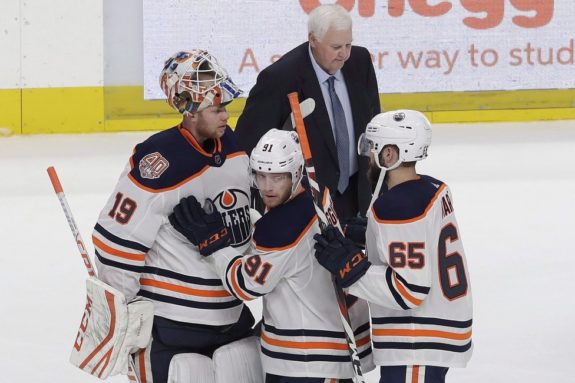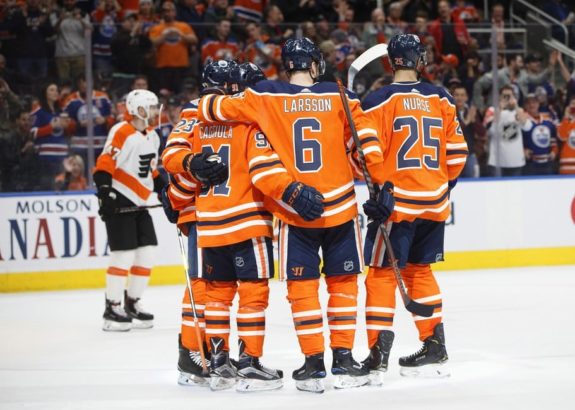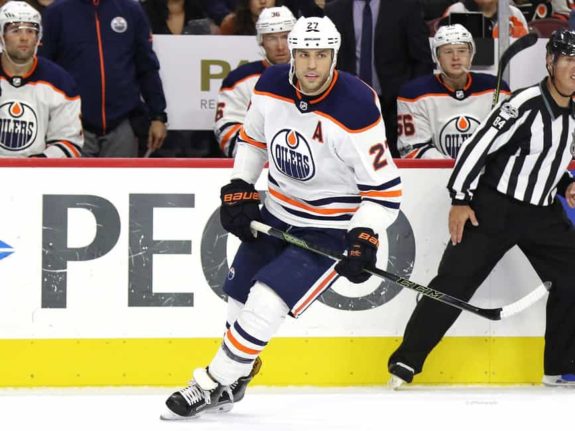![]()
Ken Hitchcock has been the head coach of the Edmonton Oilers for nearly one month and the team is winning regularly. He also has fans wrapped around his finger with his mesmerizing pre- and post-game press conferences.

Hitchcock has been a perfect match for the Edmonton Oilers and their fans, who have always favoured blue-collar players and now have a hometown coach made in their preferred image. Hitchcock’s impact is a matter of substance over style, as noted by the team’s 9-4-2 record since he took over.
A month ago the roster was littered with players who were struggling, lacked confidence, and were the target of media and fan focus for the wrong reasons. Nearly the same roster is now filled with confident players who are fulfilling their role exactly as the coach and fans expect. How is it possible?
Hitchcock Building a Belief System
Hitchcock joined the Oilers on Nov. 20, for an away game against the San Jose Sharks. The team battled to a 4-3 overtime win and in the post-game media availability, Hitchcock revealed what is central to his coaching philosophy: “We just got better and better as the game went on. We got better in the second, we were really good in the third. We really got on the grind.”
Oilers Have Bought Into the Grind
Grinding seems to be Hitchcock’s buzzword for how he expects the Oilers to develop. Ideally, the effect of a strategy or identity change would be quantifiable, but beyond the team’s overwhelming success, many underlying numbers don’t agree with the Oilers’ recent play. David Staples is one of a few Oilers writers who has identified that the Oilers’ scoring and wins under Hitchcock are surprising considering the noticeable decrease in scoring chance differential since the coaching change.
https://twitter.com/dstaples/status/1073679816468004864
Experienced coaches are aware that coaching is both a science and an art. There are many interesting explorations of the dichotomy, including one by the Player Development Project. Uncertain of how to prove the positive impact Hitchcock has made using numbers, it seems fair to credit the art of his coaching in recognition that there are often times intangible qualities that may or may not be represented in corresponding statistics.
We often see how much intangibles contribute to the small margins between victory and defeat, even if we can’t quantify them. In the 2016-17 season, which ended in Game 7 of the second round of the playoffs, a positive culture was seemingly established for the first time in over a decade of Edmonton Oilers hockey. That culture decayed in McLellan’s third season with the team and the start of his fourth, as the team was characterized by a palpable lack of ‘stick-to-it-iveness’.

Grinding is the opposite of that. The word represents a team that never stops believing in and abiding by the plan or style of play expected. The working definition for ‘the grind’ is a result of what we can observe from the team’s play, but also from what we hear. When discussing his admiration of the Winnipeg Jets in Thursday’s pre-game availability, Hitchcock described the quality of a team that he values most:
“They go the distance. They don’t try to win early. They go the distance. They just don’t trust their skill, I mean, they’ve got great skill… but they trust their work, and when you trust your work, you win a lot of games late, you win a lot of games going away, you just wear down the opposition… Once you get in a position where you really trust your work, then you know that tied is a good sign because you know you’re going to end up winning most of those tied games.”
Even more important than the coach’s words, is that the players are buying in. In an interview after Friday’s 4-1 win over the Philadelphia Flyers, Leon Draisaitl offered some evidence: “Obviously in a back-to-back, you’re always a little more exhausted than the first night, probably, but that’s when you rely on your structure and you trust the guy beside you even more.”
Identifying Players’ Roles
A second philosophy learned from Hitchcock’s first post-game press conference back on Nov. 20 was his approach to struggling or lost players, which came in the form of an answer about Milan Lucic:
“He’s spending way too much talking about not scoring, and it’s not going to help him… he knocked two guys out of the box today, he was physical on the puck, he protected the puck, he was great down low… he needs to be a really solid third line player that gets to play on the power play… he needs to get back to who he was as a junior player, and never mind what he’s not doing, he can have a huge impact in the game like he did tonight if he’s going to continue to play this way and this is what we’re going to have to expect from him.”

What Hitchcock is describing is a role that he can reasonably expect from the 2018 version of Lucic. Including and since that game, Lucic has executed that role well, and we have seen a significant uptick in fan support for him. What is expected from Lucic has been well-defined and as a result, he should be feeling less pressure and playing with a clearer mind.
A similar role definition has been established for Oscar Klefbom, Jesse Puljujarvi, and Jujhar Khaira. I’m certain, based on what we’ve heard from Hitchcock and seen with assertive play and positive results, that the entire lineup has also been told what is expected of them on every shift.
The Grind Will Keep the Oilers in the Playoff Race
Central to the success of any organization are employees – in this case players – who understand how they can contribute within their own specialized skill set. In the case of the Oilers, a strong belief system has been built over the last month that has seen nearly every player buy into a style of play for themselves and their team that appears to be suited to winning in the NHL. It is a belief system that will be challenged further over the next two months as the team is forced to play without their top defenseman, Klefbom.
With their roles defined, the Oilers are having no problem grinding. It’s easy to “trust your work,” as Hitchcock is preaching, when you know exactly what you are supposed to contribute and you are confident you can do so. It helps even further when you trust both the players and coaches that surround you. That Hitchcock has reached the Oilers players so quickly is at least in part owing to his understanding of the art of coaching this era of player.
“I think the big change… this is the most prepared group of athletes I’ve ever seen in my life, physically and mentally. I think you have to tell them everything. I think even before you finish a conversation, you gotta tell what’s it in for them, because they’re not gonna buy in if you just tell them what to do and how to do it.”
In the above quote, from Sunday’s pre-game availability, Hitchcock demonstrated an understanding of his players’ needs, something that may fly in the face of the ‘old-school coach’ label that accompanied him to Edmonton. With a future hall-of-fame coach and a group of confident players on the same page, the Oilers are poised to weather the storm brought on by recent injuries and at least remain in the playoff hunt until they are healthy.